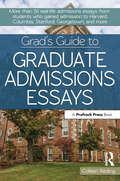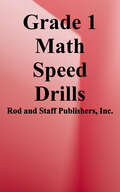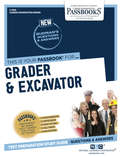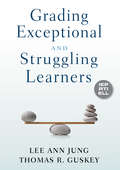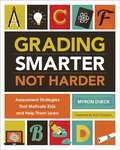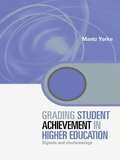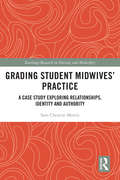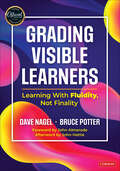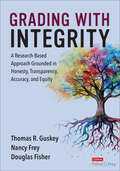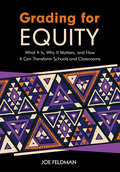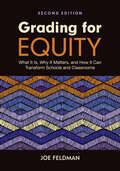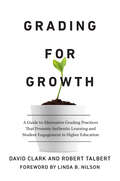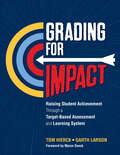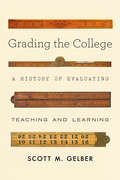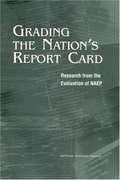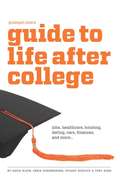- Table View
- List View
Grad's Guide to Graduate Admissions Essays: Examples From Real Students Who Got Into Top Schools
by Colleen RedingGrad's Guide to Graduate Admissions Essays provides more than 50 successful admissions essays straight from the source—recent college graduates making the transition to earning advanced degrees at highly selective graduate programs. Harvard, Columbia, Stanford, and Northwestern are just a few of the universities to which these students were admitted. Each of the essays contains designated segments highlighting the particular characteristics that make them outstanding admissions essays. Additionally, the essays are interspersed with segments labeled “Writer's Words of Wisdom,” which contain statements from the author of the particular essay with advice on the admissions process. By receiving guidance from successful graduate school applicants, readers can glean advice from a variety of perspectives, while still obtaining the critical information as it relates to well-written essays for programs within a variety of fields including law, business, medicine, education, and humanities.
Grade 1 Math Speed Drills: Beginning Arithmetic
by Rod and Staff PublishersThis small tablet of 72 speed drills provides timed practice of addition and subtractions facts. These drills begin at lesson 28 and continue through lesson 170. Speed drills are to be given every other day. Directions for using this tablet are in the teacher's manual.
Grader and Excavator: Passbooks Study Guide (Career Examination Series)
by National Learning CorporationThe Grader and Excavator Passbook® prepares you for your test by allowing you to take practice exams in the subjects you need to study. It provides hundreds of questions and answers in the areas that will likely be covered on your upcoming exam, including but not limited to: excavating and grading; erosion and sedimentation control; safety; and more.
Grading Exceptional and Struggling Learners
by Lee Ann Jung Thomas R. GuskeyA powerful model for helping struggling students succeed How can you ensure that you are grading your exceptional students fairly? Teachers receive very little guidance for grading students with disabilities, English learners, and those receiving services through a response-to-intervention (RTI) process. This practitioner-friendly book provides an effective framework for assigning grades that are accurate, meaningful, and legally defensible. The authors’ easy-to-follow, five-step standards-based inclusive grading model helps teachers: <p><p> Determine appropriate expectations for each student <p> Understand the differences between accommodations and modifications <p> Grade based on modified expectations <p> Communicate the meaning of grades to students and their families
Grading Smarter, Not Harder: Assessment Strategies That Motivate Kids and Help Them Learn
by Myron DueckAll the talk of closing the achievement gap in schools obscures a more fundamental issue: do the grades we assign to students truly reflect the extent of their learning? <p><p>In this lively and eye-opening book, educator Myron Dueck reveals how many of the assessment policies that teachers adopt can actually prove detrimental to student motivation and achievement and shows how we can tailor policies to address what really matters: student understanding of content. In sharing lessons, anecdotes, and cautionary tales from his own experiences revamping assessment procedures in the classroom, Dueck offers a variety of practical strategies for ensuring that grades measure what students know without punishing them for factors outside their control; critically examining the fairness and effectiveness of grading homework assignments; designing and distributing unit plans that make assessment criteria crystal-clear to students; creating a flexible and modular retesting system so that students can improve their scores on individual sections of important tests. <p><p>This book is brimming with reproducible forms, templates, and real-life examples of grading solutions developed to allow students every opportunity to demonstrate their learning. Written with abundant humor and heart, this book is a must-read for all teachers who want their grades to contribute to, rather than hinder, their students' success.
Grading Student Achievement in Higher Education: Signals and Shortcomings (Key Issues in Higher Education)
by Mantz YorkeA lot hangs on the summative grades that students are given. A good degree opens doors which otherwise might remain closed. Yet, as higher education is now a mass rather than an elite system, what is expected of its graduates is different from the expectations of previous generations. Students are expected not only to be able to demonstrate high standards of academic achievement, but also a variety of capabilities that have at different times been given labels such as ‘generic skills’ and ‘transferable skills’. These abilities are difficult to grade for a variety of reasons and some graduates may be losing out because their particular strengths are given insufficient acknowledgement in current summative assessment practices.Using the UK honours degree classifications as a case study, this book appraises the way in which summative assessment in higher education is approached and shows that the foundations of current practices (in the UK and elsewhere) are of questionable robustness. It argues that there is a need to widen the assessment frame if the breadth of valued student achievements is to be recognised adequately.
Grading Student Midwives’ Practice: A Case Study Exploring Relationships, Identity and Authority (Routledge Research in Nursing and Midwifery)
by Sam Chenery-MorrisThis book investigates the education and assessment of student midwives in clinical practice, paying particular attention to how their practice is graded. Chenery-Morris brings primary research, which explores students, mentors, and midwifery lecturers perspectives of practice learning and its assessment, together with the international literature on clinical knowledge, teaching and learning in practice and assessment of students drawn from a range of healthcare and education professions. Discussing how practice is graded, what constitutes valid practice knowledge, learning in clinical practice, evaluating practice learning and failing students, this book uses Basil Bernstein’s theories to throw light on how we assess and whether we should assess performance in addition to whether a student is competent to practise. This is an important contribution to the field of midwifery education. It will also be relevant to those with an interest in practice education from a range of healthcare professions.
Grading Visible Learners: Learning With Fluidity, Not Finality
by Dave Nagel Bruce PotterTransform your grading and assessment practices into powerful tools for student success When we implement a grading system that prioritizes completion and compliance and penalizes students who take risks, we disrupt the learning journey—not further it. It′s time to align how we grade with what we know from research works best and help move learning forward for all students. Grading Visible Learners provides educators with practical solutions for improving grading approaches, actions, and practices as well as concrete tools and strategies teachers and collaborative teams can adapt and use in their classrooms and schools right away. Inside you′ll find Traits to promote in students so they can drive their own learning Examples of grading and feedback actions that foster assessment capability in students Tools, templates, and work samples to help you improve your grading practices Guidance on how to promote goal-setting as well as help teachers and students view grades as feedback rather than an ending point in the learning journey Multiple ways for students to show growth and progress In this hands-on guidebook, you will discover how to best impact learning and ensure that grading serves as a constructive tool and conduit to maximizing impact on student learning rather than a hindrance to student success.
Grading Visible Learners: Learning With Fluidity, Not Finality
by Dave Nagel Bruce PotterTransform your grading and assessment practices into powerful tools for student success When we implement a grading system that prioritizes completion and compliance and penalizes students who take risks, we disrupt the learning journey—not further it. It′s time to align how we grade with what we know from research works best and help move learning forward for all students. Grading Visible Learners provides educators with practical solutions for improving grading approaches, actions, and practices as well as concrete tools and strategies teachers and collaborative teams can adapt and use in their classrooms and schools right away. Inside you′ll find Traits to promote in students so they can drive their own learning Examples of grading and feedback actions that foster assessment capability in students Tools, templates, and work samples to help you improve your grading practices Guidance on how to promote goal-setting as well as help teachers and students view grades as feedback rather than an ending point in the learning journey Multiple ways for students to show growth and progress In this hands-on guidebook, you will discover how to best impact learning and ensure that grading serves as a constructive tool and conduit to maximizing impact on student learning rather than a hindrance to student success.
Grading With Integrity: A Research-Based Approach Grounded in Honesty, Transparency, Accuracy, and Equity
by Douglas Fisher Nancy Frey Thomas R. GuskeyLet evidence and integrity guide your grading practice If you want to ask a polarizing question in education, ask someone their thoughts on grading. Few topics have elicited more interest or opinions, even though grading practices have remained relatively unchanged for years. But opinions are not evidence. The time has come to get it right with a fresh approach grounded in research and the principles of integrity. Grading With Integrity introduces a measured approach to grading reform based on honesty, transparency, accuracy, and equity with recommendations backed by clear and trustworthy evidence. Addressing the many "whys’’ involved, this thoughtfully organized book addresses central questions related to grading and reporting student learning, covering: An historical overview of grading and reporting practices A discussion of standards-based and competency-based grading Recommendations for reporting non academic learning goals separately from academic achievement, to accurately reflect students′ performance Suggestions for reporting growth and improvement, using specific assessments and other reporting tools An infallible argument for grading with integrity This book is a must-read for K-12 classroom teachers and administrators who are looking to implement better and more defensible grading and reporting policies and practices. Let evidence and integrity be your guide to enhancing students’ best interests and learning success.
Grading With Integrity: A Research-Based Approach Grounded in Honesty, Transparency, Accuracy, and Equity
by Douglas Fisher Nancy Frey Thomas R. GuskeyLet evidence and integrity guide your grading practice If you want to ask a polarizing question in education, ask someone their thoughts on grading. Few topics have elicited more interest or opinions, even though grading practices have remained relatively unchanged for years. But opinions are not evidence. The time has come to get it right with a fresh approach grounded in research and the principles of integrity. Grading With Integrity introduces a measured approach to grading reform based on honesty, transparency, accuracy, and equity with recommendations backed by clear and trustworthy evidence. Addressing the many "whys’’ involved, this thoughtfully organized book addresses central questions related to grading and reporting student learning, covering: An historical overview of grading and reporting practices A discussion of standards-based and competency-based grading Recommendations for reporting non academic learning goals separately from academic achievement, to accurately reflect students′ performance Suggestions for reporting growth and improvement, using specific assessments and other reporting tools An infallible argument for grading with integrity This book is a must-read for K-12 classroom teachers and administrators who are looking to implement better and more defensible grading and reporting policies and practices. Let evidence and integrity be your guide to enhancing students’ best interests and learning success.
Grading for Equity: What It Is, Why It Matters, and How It Can Transform Schools and Classrooms
by Joe Feldman“Joe Feldman shows us how we can use grading to help students become the leaders of their own learning and lift the veil on how to succeed. . . . This must-have book will help teachers learn to implement improved, equity-focused grading for impact.” --Zaretta Hammond, Author of Culturally Responsive Teaching & The Brain Crack open the grading conversation Here at last—and none too soon—is a resource that delivers the research base, tools, and courage to tackle one of the most challenging and emotionally charged conversations in today’s schools: our inconsistent grading practices and the ways they can inadvertently perpetuate the achievement and opportunity gaps among our students. With Grading for Equity, Joe Feldman cuts to the core of the conversation, revealing how grading practices that are accurate, bias-resistant, and motivational will improve learning, minimize grade inflation, reduce failure rates, and become a lever for creating stronger teacher-student relationships and more caring classrooms. Essential reading for schoolwide and individual book study or for student advocates, Grading for Equity provides A critical historical backdrop, describing how our inherited system of grading was originally set up as a sorting mechanism to provide or deny opportunity, control students, and endorse a “fixed mindset” about students’ academic potential—practices that are still in place a century later A summary of the research on motivation and equitable teaching and learning, establishing a rock-solid foundation and a “true north” orientation toward equitable grading practices Specific grading practices that are more equitable, along with teacher examples, strategies to solve common hiccups and concerns, and evidence of effectiveness Reflection tools for facilitating individual or group engagement and understanding As Joe writes, “Grading practices are a mirror not just for students, but for us as their teachers.” Each one of us should start by asking, “What do my grading practices say about who I am and what I believe?” Then, let’s make the choice to do things differently . . . with Grading for Equity as a dog-eared reference.
Grading for Equity: What It Is, Why It Matters, and How It Can Transform Schools and Classrooms
by Joe Feldman“Joe Feldman shows us how we can use grading to help students become the leaders of their own learning and lift the veil on how to succeed. . . . This must-have book will help teachers learn to implement improved, equity-focused grading for impact.” --Zaretta Hammond, Author of Culturally Responsive Teaching & The Brain Crack open the grading conversation Here at last—and none too soon—is a resource that delivers the research base, tools, and courage to tackle one of the most challenging and emotionally charged conversations in today’s schools: our inconsistent grading practices and the ways they can inadvertently perpetuate the achievement and opportunity gaps among our students. With Grading for Equity, Joe Feldman cuts to the core of the conversation, revealing how grading practices that are accurate, bias-resistant, and motivational will improve learning, minimize grade inflation, reduce failure rates, and become a lever for creating stronger teacher-student relationships and more caring classrooms. Essential reading for schoolwide and individual book study or for student advocates, Grading for Equity provides A critical historical backdrop, describing how our inherited system of grading was originally set up as a sorting mechanism to provide or deny opportunity, control students, and endorse a “fixed mindset” about students’ academic potential—practices that are still in place a century later A summary of the research on motivation and equitable teaching and learning, establishing a rock-solid foundation and a “true north” orientation toward equitable grading practices Specific grading practices that are more equitable, along with teacher examples, strategies to solve common hiccups and concerns, and evidence of effectiveness Reflection tools for facilitating individual or group engagement and understanding As Joe writes, “Grading practices are a mirror not just for students, but for us as their teachers.” Each one of us should start by asking, “What do my grading practices say about who I am and what I believe?” Then, let’s make the choice to do things differently . . . with Grading for Equity as a dog-eared reference.
Grading for Equity: What It Is, Why It Matters, and How It Can Transform Schools and Classrooms
by Joe FeldmanRaise standards and improve learning for all students through equitable grading Grading–one of the most important responsibilities of teachers with major implications for students’ academic and life trajectories–is ironically also among the most enigmatic and frequently avoided topics in education. Although most teachers sense that common grading practices are often ineffective, there is limited understanding of how those practices can undermine effective teaching and harm students, particularly those historically underserved. It is long past due to implement grading practices that are more accurate, bias-resistant, and motivational, and which improve student learning, empower teachers, and transform classrooms as a result. In this newly updated edition of the best-selling Grading for Equity, Joe Feldman provides a valuable resource for anyone invested in grading and its impact on students’ education, mental health, and future opportunities. Offering a research-based alternative to the status quo, this practitioner-friendly guide provides Extensive revisions that reflect how the pandemic and the Black Lives Matter movement shifted traditional grading systems New data from both academic research and classrooms that demonstrate the benefits of equitable grading for all students Clear approaches to implement equitable grading practices Updated information on several equitable grading practices, including proficiency scales A new concluding chapter that explores implementing equitable grading system-wide With a down-to-earth style driven by the author’s own curiosity as a teacher, principal, district administrator, and university instructor, this book will invite and challenge you to think about how more equitable grading, when implemented effectively, creates a more rigorous, humane, and positive school experience for all.
Grading for Equity: What It Is, Why It Matters, and How It Can Transform Schools and Classrooms
by Joe FeldmanRaise standards and improve learning for all students through equitable grading Grading–one of the most important responsibilities of teachers with major implications for students’ academic and life trajectories–is ironically also among the most enigmatic and frequently avoided topics in education. Although most teachers sense that common grading practices are often ineffective, there is limited understanding of how those practices can undermine effective teaching and harm students, particularly those historically underserved. It is long past due to implement grading practices that are more accurate, bias-resistant, and motivational, and which improve student learning, empower teachers, and transform classrooms as a result. In this newly updated edition of the best-selling Grading for Equity, Joe Feldman provides a valuable resource for anyone invested in grading and its impact on students’ education, mental health, and future opportunities. Offering a research-based alternative to the status quo, this practitioner-friendly guide provides Extensive revisions that reflect how the pandemic and the Black Lives Matter movement shifted traditional grading systems New data from both academic research and classrooms that demonstrate the benefits of equitable grading for all students Clear approaches to implement equitable grading practices Updated information on several equitable grading practices, including proficiency scales A new concluding chapter that explores implementing equitable grading system-wide With a down-to-earth style driven by the author’s own curiosity as a teacher, principal, district administrator, and university instructor, this book will invite and challenge you to think about how more equitable grading, when implemented effectively, creates a more rigorous, humane, and positive school experience for all.
Grading for Growth: A Guide to Alternative Grading Practices that Promote Authentic Learning and Student Engagement in Higher Education
by David Clark Robert TalbertAre you satisfied with your current and traditional grading system? Does it accurately reflect your students’ learning and progress? Can it be gamed? Does it lead to grade-grubbing and friction with your students?The authors of this book – two professors of mathematics with input from colleagues across disciplines and institutions – offer readers a fundamentally more effective and authentic approach to grading that they have implemented for over a decade. Recognizing that traditional grading penalizes students in the learning process by depriving them of the formative feedback that is fundamental to improvement, the authors offer alternative strategies that encourage revision and growth.Alternative grading is concerned with students’ eventual level of understanding. This leads to big changes: Students take time to review past failures and learn from them. Conversations shift from “why did I lose a point for this” to productive discussions of content and process.Alternative grading can be used successfully at any level, in any situation, and any discipline, in classes that range from seminars to large multi-section lectures.This book offers a comprehensive introduction to alternative grading, beginning with a framework and rationale for implementation and evidence of its effectiveness. The heart of the book includes detailed examples – including variations on Standards-Based Grading, Specifications Grading, and ungrading -- of how alternative grading practices are used in all kinds of classroom environments, disciplines and institutions with a focus on first-hand accounts by faculty who share their practices and experience. The book includes a workbook chapter that takes readers through a step-by-step process for building a prototype of their own alternatively graded class and ends with concrete, practical, time-tested advice for new practitioners.The underlying principles of alternative grading involve·Evaluating student work using clearly defined and context-appropriate content standards.·Giving students helpful, actionable feedback.·Summarizing the feedback with marks that indicate progress rather than arbitrary numbers.·Allowing students to revise without penalty, using the feedback they receive, until the standards are met or exceeded.This book is intended for faculty interested in exploring alternative forms of learning assessment as well as those currently using alternative grading systems who are looking for ideas and options to refine practice.
Grading for Growth: A Guide to Alternative Grading Practices that Promote Authentic Learning and Student Engagement in Higher Education
by David Clark Robert TalbertAre you satisfied with your current and traditional grading system? Does it accurately reflect your students’ learning and progress? Can it be gamed? Does it lead to grade-grubbing and friction with your students?The authors of this book – two professors of mathematics with input from colleagues across disciplines and institutions – offer readers a fundamentally more effective and authentic approach to grading that they have implemented for over a decade.Recognizing that traditional grading penalizes students in the learning process by depriving them of the formative feedback that is fundamental to improvement, the authors offer alternative strategies that encourage revision and growth.Alternative grading is concerned with students’ eventual level of understanding. This leads to big changes: Students take time to review past failures and learn from them. Conversations shift from “why did I lose a point for this” to productive discussions of content and process.Alternative grading can be used successfully at any level, in any situation, and any discipline, in classes that range from seminars to large multi-section lectures. This book offers a comprehensive introduction to alternative grading, beginning with a framework and rationale for implementation and evidence of its effectiveness. The heart of the book includes detailed examples – including variations on Standards-Based Grading, Specifications Grading, and ungrading -- of how alternative grading practices are used in all kinds of classroom environments, disciplines and institutions with a focus on first-hand accounts by faculty who share their practices and experience. The book includes a workbook chapter that takes readers through a step-by-step process for building a prototype of their own alternatively graded class and ends with concrete, practical, time-tested advice for new practitioners.The underlying principles of alternative grading involve·Evaluating student work using clearly defined and context-appropriate content standards.·Giving students helpful, actionable feedback.·Summarizing the feedback with marks that indicate progress rather than arbitrary numbers.·Allowing students to revise without penalty, using the feedback they receive, until the standards are met or exceeded.This book is intended for faculty interested in exploring alternative forms of learning assessment as well as those currently using alternative grading systems who are looking for ideas and options to refine practice.
Grading for Impact: Raising Student Achievement Through a Target-Based Assessment and Learning System
by Tom Hierck Garth L. LarsonAim for a target-based grading system and create stronger learning opportunities! As grading, assessment, and reporting continue to be a relevant topic of discussion, this book creates a functional plan to move standards-based grading practices forward in schools. Teachers and teacher leaders will learn how to assess, grade, and report against specific learning targets rather than standards as a whole. Grounded in application to provide focus and clarity, this book features: Case studies of schools that have incorporated target-based assessment, feedback, grading, and reporting Practical examples to guide implementation Questions, checklists, illustrations, and audits of practice to showcase the work in action
Grading for Impact: Raising Student Achievement Through a Target-Based Assessment and Learning System
by Tom Hierck Garth L. LarsonAim for a target-based grading system and create stronger learning opportunities! As grading, assessment, and reporting continue to be a relevant topic of discussion, this book creates a functional plan to move standards-based grading practices forward in schools. Teachers and teacher leaders will learn how to assess, grade, and report against specific learning targets rather than standards as a whole. Grounded in application to provide focus and clarity, this book features: Case studies of schools that have incorporated target-based assessment, feedback, grading, and reporting Practical examples to guide implementation Questions, checklists, illustrations, and audits of practice to showcase the work in action
Grading the College: A History of Evaluating Teaching and Learning
by Scott M. GelberA comprehensive history of evaluation in American higher education.In Grading the College, Scott M. Gelber offers a comprehensive history of evaluating teaching and learning in higher education. He complicates the conventional narrative that portrays evaluation as a newfangled assault on the integrity of higher education while acknowledging that there are many compelling reasons to oppose those practices. The evaluation of teaching and learning, Gelber argues, presented genuine dilemmas that have attracted the attention of faculty members and academic leaders since the 1920s. Especially during the peak era of faculty authority that followed the end of the Second World War, significant numbers of professors and administrators believed that evaluation might improve institutional performance, reduce the bias inherent in traditional methods of supervision, strengthen communication with laypersons, and encourage a more deliberate focus on the distinctive goals of college.Gelber reveals the extent to which professors and academic interest groups participated in the development of our most common evaluation instruments, including student course questionnaires, achievement tests, surveys, rubrics, rankings, and accreditation self-studies. Although these efforts may seem distant from the present era of shortsighted scrutiny and ill-conceived comparisons, Gelber demonstrates that the evaluation of college teaching and learning has long consisted of a set of intellectually sophisticated questions that have engaged, and could continue to engage, faculty members and their advocates. By providing a deeper understanding of how evaluation operated before the dawn of high-stakes accountability, Grading the College seeks to promote productive conversations about current attempts to define and measure the purposes of American higher education.
Grading the Nation's Report Card: Evaluating NAEP and Transforming the Assessment of Educational Progress
by National Research CouncilSince the late 1960s, the National Assessment of Educational Progress (NAEP)--the nation's report card--has been the only continuing measure of student achievement in key subject areas. Increasingly, educators and policymakers have expected NAEP to serve as a lever for education reform and many other purposes beyond its original role.Grading the Nation's Report Card examines ways NAEP can be strengthened to provide more informative portrayals of student achievement and the school and system factors that influence it. The committee offers specific recommendations and strategies for improving NAEP's effectiveness and utility, including: Linking achievement data to other education indicators.Streamlining data collection and other aspects of its design.Including students with disabilities and English-language learners.Revamping the process by which achievement levels are set.The book explores how to improve NAEP framework documents--which identify knowledge and skills to be assessed--with a clearer eye toward the inferences that will be drawn from the results.What should the nation expect from NAEP? What should NAEP do to meet these expectations? This book provides a blueprint for a new paradigm, important to education policymakers, professors, and students, as well as school administrators and teachers, and education advocates.
Grading the Nation's Report Card: Research from the Evaluation of NAEP
by Committee on the Evaluation of National State Assessments of Educational ProgressThe National Assessment of Educational Progress (NAEP), known as the nation's report card, has chronicled students' academic achievement in America for over a quarter of a century. It has been a valued source of information about students' performance, providing the best available trend data on the academic achievement of elementary, middle, and secondary school students in key subject areas. NAEP's prominence and the important need for stable and accurate measures of academic achievement call for evaluation of the program and an analysis of the extent to which its results are reasonable, valid, and informative to the public.This volume of papers considers the use and application of NAEP. It provides technical background to the recently published book, Grading the Nation's Report Card: Evaluating NAEP and Transforming the Assessment of Educational Progress (NRC, 1999), with papers on four key topics: NAEP's assessment development, content validity, design and use, and more broadly, the design of education indicator systems.
Grading, Reporting, Graduating...and the Law
by Miriam Kurtzig FreedmanYour quick flipbook guide to grades, report cards, and graduation requirements The legal issues around grading, reporting, and graduating can be complex, and it is important that educators clearly understand them in order to implement best practices for students. Written by teacher-turned-lawyer Miriam Kurtzig Freedman, this easy-to-read flipbook helps K-12 teachers and administrators gain confidence in how they implement and understand the legal requirements of grading, reporting, and graduating, and helps parents support their children in school. Readers will learn: How to handle the legal requirements for accessible and valid grades, report cards, transcripts, honors, and diplomas for all students, including those with disabilities How to provide and receive honest feedback that inspires trust How to explain legal requirements to colleagues, students, and parents in plain language With its glossary and list of relevant case law, this handy and inspiring guide will help readers confidently handle difficult issues like graduation requirements, weighted grades, testing accommodations, modifications and adaptations, and more—freeing them to focus on better teaching and learning for all students.
Grading, Reporting, Graduating...and the Law
by Miriam Kurtzig FreedmanYour quick flipbook guide to grades, report cards, and graduation requirements The legal issues around grading, reporting, and graduating can be complex, and it is important that educators clearly understand them in order to implement best practices for students. Written by teacher-turned-lawyer Miriam Kurtzig Freedman, this easy-to-read flipbook helps K-12 teachers and administrators gain confidence in how they implement and understand the legal requirements of grading, reporting, and graduating, and helps parents support their children in school. Readers will learn: How to handle the legal requirements for accessible and valid grades, report cards, transcripts, honors, and diplomas for all students, including those with disabilities How to provide and receive honest feedback that inspires trust How to explain legal requirements to colleagues, students, and parents in plain language With its glossary and list of relevant case law, this handy and inspiring guide will help readers confidently handle difficult issues like graduation requirements, weighted grades, testing accommodations, modifications and adaptations, and more—freeing them to focus on better teaching and learning for all students.
Gradspot.com's Guide to Life After College
by David Klein Stuart Schultz Chris Schonberger Tory HoenWhether you're searching for your first job or apartment, navigating the treacherous waters of office politics, or just trying to figure out how to file your tax return, Gradspot.com's Guide to Life After College tackles the most common issues facing twentysomethings as they find their feet in the â œreal world.â Authors Chris Schonberger, Stuart Schultz, David Klein, and Tory Hoen (twentysomethings themselves) have been through it all before, and they maintain a sense of humor about their triumphs and missteps along the way. In addition to sharing their own experiences and anecdotes, they have polled hundreds of recent grads and consulted topic experts to give readers the information they need, to find their feet beyond campus. Packed with indispensable tips, candid advice, and humorous dispatches from early adulthood, this easy-to-use guide has everything you need to know but didn't learn in college!Topics include: Finding an Apt, Job Hunting, Healthcare, Credit, Top Recent Grad Cities, Cars, Student Debt, Saving & Investing, Office Etiquette, Networking, Dating, Travel, Cooking, Moving Home, The "One-Year Rut", 401(k)s, and more.
